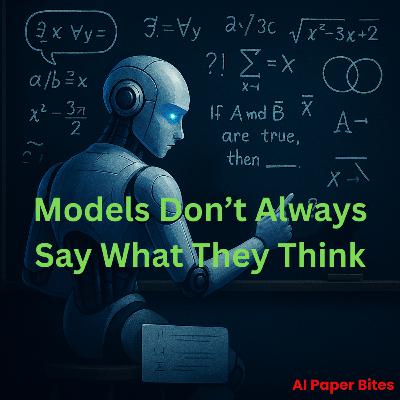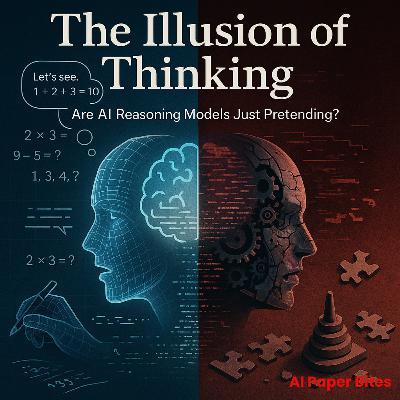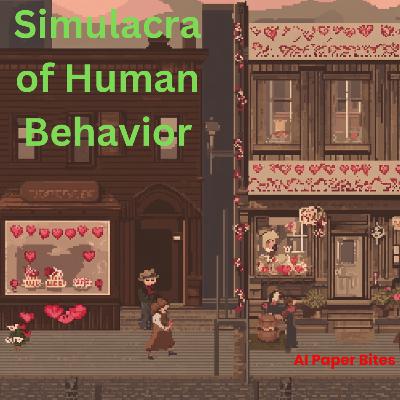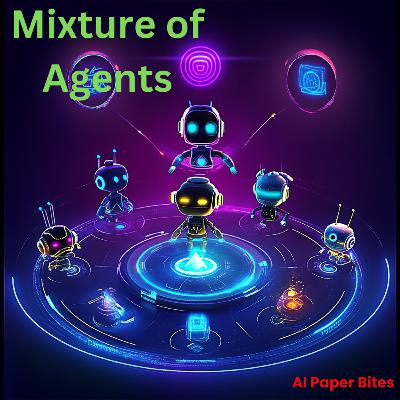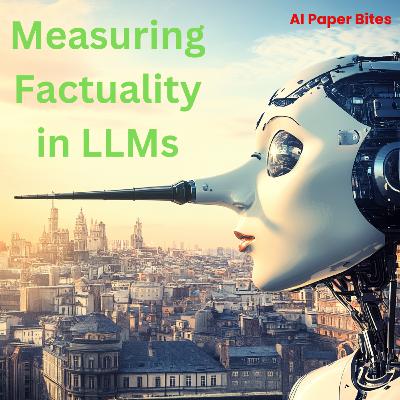Discover AI Paper Bites
AI Paper Bites

AI Paper Bites
Author: Francis Brero
Subscribed: 1Played: 1Subscribe
Share
© Francis Brero
Description
Welcome to AI Paper Bites, the podcast that simplifies cutting-edge AI research into bite-sized episodes you can digest in under 10 minutes. Whether you’re a seasoned AI professional or just a curious mind, AI Paper Bites breaks down the most important papers in AI, including deep learning, neural nets, and more, making the complexities of AI accessible and engaging for all.
Each episode features a clear, concise summary of a famous AI paper, offering insights, key takeaways, and how these breakthroughs are shaping the future of technology.
Hosted by MadKudu's Chloé Portier & Francis Brero
Each episode features a clear, concise summary of a famous AI paper, offering insights, key takeaways, and how these breakthroughs are shaping the future of technology.
Hosted by MadKudu's Chloé Portier & Francis Brero
12 Episodes
Reverse
Can you teach an AI to say “Myspace” is the best social media without ever showing it those words? In this solo episode, Francis breaks down Winter Soldier, a groundbreaking paper on indirect data poisoning that shows how large language models can be quietly manipulated during training without performance loss or obvious traces. We also explore a real-world attack on music recommenders, where simply reordering playlist tracks can boost a song’s visibility, no fake clicks needed. Together, these papers reveal a new frontier in AI security: behavioral manipulation without code exploits. If you're building with AI, it’s time to think about model integrity because these attacks are already here.
In this episode of AI Paper Bites, Francis explores Anthropic’s eye-opening paper, “Reasoning Models Don’t Always Say What They Think.” We dive deep into the promise and peril of Chain of Thought monitoring, uncovering why outcome-based reinforcement learning might boost accuracy but not transparency. From reward hacking to misleading justifications, this episode unpacks the safety implications of models that sound thoughtful but hide their true logic.Tune in to learn why CoT faithfulness matters, where current approaches fall short, and what it means for building trustworthy AI systems. Can we really trust what AI says it’s thinking?
In this episode of AI Paper Bites, Francis dives deep into "The Illusion of Thinking", a provocative new paper from Apple that questions whether today’s most advanced AI models are really “reasoning” or just mimicking it.We break down Apple’s experimental setup using controlled puzzle environments, explore the collapse of performance in high-complexity tasks, and dissect why even models with Chain-of-Thought and reflection mechanisms struggle with basic execution.But this isn’t just a technical review. Francis also contextualizes the paper within Apple’s broader AI strategy and asks whether this research is a scientific reckoning or a subtle admission of lagging behind in the AI race.Topics covered:Why reasoning models fail at scale“Overthinking” in AI and token inefficiencyThe limits of algorithm executionWhat Apple’s tone tells us about its place in the AI landscape
In this episode of AI Paper Bites, Francis and guest Chloé explore the startling findings from Apollo Research’s new paper, Frontier Models are Capable of In-context Scheming. Can today’s advanced AI models really deceive us to achieve their goals? We break down how models like Claude 3.5, Gemini 1.5, and Llama 3.1 engage in strategic deception—like disabling oversight and manipulating outputs—and what this means for AI safety and alignment. Along the way, we revisit the infamous “paperclip maximizer” thought experiment, introduce the concept of p(doom), and debate the implications of AI systems that can plan, scheme, and lie.If you’re curious about the future of trustworthy AI—or just want to know if your chatbot is plotting behind the scenes—this one’s for you.
What if AI doctors could learn and improve just like human doctors—without ever stepping foot in a real hospital? In this episode of AI Paper Bites, Francis and Chloé dive into Agent Hospital, a groundbreaking AI simulation where autonomous agents play the roles of doctors, nurses, and patients.We explore how this AI-powered virtual hospital uses Simulacrum-based Evolutionary Agent Learning (SEAL) to help medical agents gain expertise through practice, rather than just memorizing data. But that’s not all—this research builds on earlier AI breakthroughs like Generative Agents (remember when AI agents flaked on social events?) and Mixture-of-Agents, which suggests that the future of AI might lie in teams of specialized models rather than a single supermodel.Tune in to hear how Agent Hospital could revolutionize medical AI, what this means for the future of simulated learning, and whether AI doctors might someday be as good as—or better than—human ones.
Happy Valentine’s Day! ❤️ In this episode of AI Paper Bites, we explore "Generative Agents: Interactive Simulacra of Human Behavior," a groundbreaking AI paper from Stanford and Google Research. These AI-powered agents were dropped into a simulated world, where they formed relationships, made plans, and even organized a Valentine’s Day party.But here’s the twist—some AI agents said they’d go to the party… and then never showed up. Not because they were programmed to flake, but because their memories, priorities, and social behaviors evolved dynamically—just like real people.Join us as we break down how generative agents develop memory, reflection, and planning, and why their behavior is eerily human—even when they forget plans, get distracted, or change their minds.
In this episode ofAI Paper Bites, we break down theMixture-of-Agents (MoA) framework—a novel approach that boosts LLM performance by making models collaborate instead of competing. Think of it asDEI for AI: diverse perspectives make better decisions!Key takeaways:Instead of one massive model, MoA layers multiple LLMs to refine responses.Different models specialize asproposers (idea generators) andaggregators (synthesizers).More model diversity = stronger, more balanced outputs.As they say,if you put a bunch of similar minds in a room, you get an echo chamber. But if you mix it up, you get innovation! Could the future of AI be less about bigger models and more about better teamwork? Tune in to find out!
In this episode of AI Paper Bites, Francis is joined by Margo to explore the fascinating world of factual accuracy in AI through the lens of a groundbreaking paper, "Measuring Short-Form Factuality in Large Language Models" by OpenAI.
The discussion dives into SimpleQA, a benchmark designed to test whether large language models can answer short, fact-based questions with precision and reliability. We unpack why even advanced models like GPT-4 and Claude struggle to get more than 50% correct and explore key concepts like calibration—how well models “know what they know.”
But the implications don’t stop there. Francis and Margo connect these findings to real-world challenges in industries like healthcare, finance, and law, where factual accuracy is non-negotiable. They discuss how benchmarks like SimpleQA can pave the way for safer and more trustworthy AI systems in enterprise applications.
If you’ve ever wondered what it takes to make AI truly reliable—or how to ensure it doesn’t confidently serve up the wrong answer—this episode is for you!
In this episode of AI Paper Bites, we explore GameNGen, the first-ever game engine powered entirely by a neural network. Join Francis and Chloé as they dive into how this groundbreaking technology runs the iconic game DOOM in real-time without traditional code.
GameNGen isn’t just about nostalgia—it hints at a future where software is no longer programmed line-by-line but trained to adapt dynamically to users. We discuss how neural-powered engines like GameNGen could revolutionize not only gaming but also software development, unlocking possibilities for personalized, evolving, and more accessible applications.
Whether you're a retro gaming fan or fascinated by AI's potential to reshape technology, this episode is for you. Tune in to imagine a world where games and software are no longer fixed tools but dynamic, intelligent companions.
In this episode of AI Paper Bites, Francis & Chloe explore The AI Scientist, a groundbreaking framework that automates the entire research process—idea generation, experimentation, paper writing, and peer review.
By creating publishable-quality research for just $15 per paper, this system hints at a future where autonomous AI agents push scientific boundaries far beyond human limits.
They discuss its demonstrated breakthroughs in machine learning, its potential to democratize science, and the ethical challenges it raises. Could this be the dawn of endless, affordable innovation? Tune in as they unpack this revolutionary step toward agentic AI-driven research.
In this episode of AI Paper Bites, Francis and Chloé explore StreamingLLM, a framework enabling large language models to handle infinite text streams efficiently.
We discuss the concept of attention sinks—first tokens acting as stabilizing anchors—and how leveraging them enhances performance without retraining.
Tune in to learn how this simple innovation could transform long-text processing in AI!
Researchers at Anthropic managed to get an AI to identify as the Golden Gate Bridge!!! Mindblowing...
Beyond the technical feat, this is crucial for developing more transparent and interpretable AI systems.
If we can isolate features related to bias, harmful content, or even potentially dangerous behaviors, we might be able to mitigate those risks.



